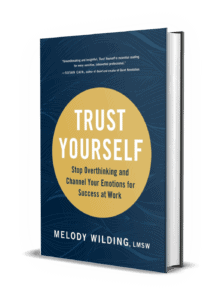My client Jill, a seasoned marketing strategist, had a long list of achievements. When we first met though, she told me, “I worry that, at any moment, my boss and colleagues will realize I have no idea what I’m doing. I’m not truly an expert; I’m simply making things up as I go along.” Yet, over her 20-year career, she had received numerous industry awards and was even promoted twice in one year. Despite these accolades, Jill was constantly haunted by thoughts of her inadequacy. Internalizing her success felt like a far-off dream.
Jill struggles with imposter syndrome, an experience of intellectual phoniness first described by psychologists in 1978. Today, scientists estimate that up to 82% of people face impostor syndrome, which can include feeling as if they have deceived others into believing that they are more intelligent and capable than they really are.
Through coaching Sensitive Strivers over the last decade, I’ve witnessed this type of chronic self-doubt hold countless intelligent individuals back from speaking up and sharing their ideas, advocating for new opportunities, taking risks, and even practicing much-needed self-care.
A disconnect between a person’s self-perception and reality is at the core of imposter syndrome. While you may possess skills, training, and degrees, and have a track record of accomplishments, you may struggle to attribute your success to your competence. Instead, you dismiss it and credit luck, timing, charm, or even good looks. In other words, people with imposter syndrome have trouble internalizing their successes. They have difficulty owning their accomplishments and integrating those experiences into a more positive view of themselves.
It’s possible to overcome imposter syndrome by retraining your thinking and internalizing your successes—without becoming big-headed. Here’s how.
Free BOOK CHAPTER
Turn your sensitivity into a strength and regain your confidence at work
Get exclusive access to Chapter One of my book, Trust Yourself: Stop Overthinking and Channel Your Emotions for Success at Work.
By submitting this form you consent to receive newsletters and promotions via email. Unsubscribe or opt-out any time. See our Privacy Policy.
5 Ways to Promote Internalizing Your Success
1. REWRITE MISCONCEPTIONS ABOUT CONFIDENCE
Many professionals I coach are hesitant to acknowledge their achievements. They don’t want to come off as too conceited or cocky, nor do they want to become lazy and complacent.
Keep in mind that there’s a big difference between healthy confidence and overconfidence. Those with healthy confidence are not only secure in their judgments and strengths, but they can also show humility and admit their weaknesses. Overconfident people, on the other hand, overestimate their competence and think they can excel in areas in which they have no knowledge. This is often referred to as the Dunning-Kruger effect.
But perhaps you have thought that being hard on yourself is what keeps you striving higher. Research shows that self-criticism is a poor strategy. When used excessively, it is consistently associated with less motivation, reduced self-control, and greater procrastination. Instead, consider how you might take a more self-compassionate approach. For instance, if your friend landed a great new role, would you tell them, “eh, you got lucky”? Or would you celebrate them?
2. SHIFT YOUR EXPLANATORY STYLE
In the late 1990s, psychologists Gregory Buchanan and Martin Seligman coined the term “explanatory style” to describe the way people interpret events that happen to them. People with imposter syndrome tend to have a pessimistic explanatory style. When something good happens to them, they tend to attribute it to external factors, such as luck or timing. They see any success as temporary and fleeting.
The good news is that you can train yourself to have a more optimistic explanatory style, which is shown to lead to greater happiness, motivation, and productivity. This style can help you to interpret positive events that happen to you as a result of internal factors, such as your inherent capabilities or effort, and is more long-lasting.
Consider something good that happened to you this past week and explain it in an optimistic versus a pessimistic style. For example, perhaps you were assigned to a high-visibility project at work. Instead of assuming you’re on the team because the client likes you (pessimistic style), consider how your background, expertise, or talent contributed to you being nominated for the project.
3. ACCEPT COMPLIMENTS
When someone applauds your work, are you quick to brush off their praise and say, “Oh, it was nothing”? When you experience imposter syndrome, praise can create cognitive dissonance. Because positive feedback about your capabilities doesn’t fit into your current self-image, you reject it.
The next time someone gives you a compliment, try to receive it graciously. Resist the urge to explain away your successes or to rattle off a string of justifications as to why your accomplishment is no big deal. Instead, keep your response short and simple, such as, “Thank you, I’m so glad you noticed,” or, “I appreciate that.”
You can take this a step further by asking a question to get more information about your strengths, such as, “Thanks for the feedback. What did you enjoy about my presentation?” or, “What stood out to you the most?”
4. START A BRAG FILE
Achieving your goals is great, but you’ll never gain confidence from them if you simply move on to the next thing and don’t pause to celebrate your wins. Psychologically speaking, celebrating your accomplishments isn’t frivolous: When you do so, your body releases endorphins that reinforce a feeling of competence.
One simple way to do this is by creating a brag file. This is a place where you keep a log of your wins at work. It can be kept as a Microsoft Word or Google doc, an Evernote, or even in an email folder.
A brag file can help you look back on your work with a healthy sense of pride. This could include concrete accomplishments like hitting a major milestone or kind words from customers, colleagues, or your manager. Your brag file can help you better understand your skills and what type of work you most enjoy doing. It even comes in handy for performance reviews or job searching.
5. BROADEN YOUR DEFINITION OF A WIN
Imposter syndrome is closely connected with perfectionism, which can lead you to define achievement in a hyper-specific way—complete and total excellence at all times. In order to beat imposter syndrome, you don’t need to lower your bar, but you do need to broaden your scope of what qualifies as a “win.” Give yourself more credit for moments of strength that grow your resilience and resourcefulness by broadening your definition of success to include the following:
- Pushing through a fear
- Having a difficult conversation
- Advocating for your ideas
- Setting a boundary
- Approaching a situation with a different mindset
- Taking a small step toward a goal
Take a few moments at the end of your workday to consider moments where you made yourself proud. Research shows that savoring, the psychological practice of reflecting on and appreciating positive moments, can boost feelings of satisfaction and self-efficacy.
With effort and intentionality, you can make your thoughts work for you instead of against you and ensure that imposter syndrome doesn’t steal your joy.
—–
Get My Book: Trust Yourself
 Groundbreaking and insightful, TRUST YOURSELF is essential reading for every sensitive, introverted professional. Wilding does a brilliant job of giving you tools to regain your confidence and become your most empowered self.
Groundbreaking and insightful, TRUST YOURSELF is essential reading for every sensitive, introverted professional. Wilding does a brilliant job of giving you tools to regain your confidence and become your most empowered self.
–Susan Cain, author of Quiet and creator of Quiet Revolution
Trust Yourself offers a neuroscience-based blueprint based on decades of research and client work to help you break free from stress, self-doubt, and perfectionism so you can regain your confidence at work and reclaim control of your life.
In Trust Yourself, discover how to:
- Achieve confidence and overcome imposter syndrome
- Find your voice to speak and act with assertiveness
- Build resilience and bounce back from setbacks
- Enjoy your success without sacrificing your well-being
If you’re an empathetic, driven person trying to navigate your career and learn how to believe in yourself in the process, Trust Yourself offers the mindset and tools to set you on the path to personal and professional fulfillment.
© 2023 Melody Wilding // originally published on Fast Company.




